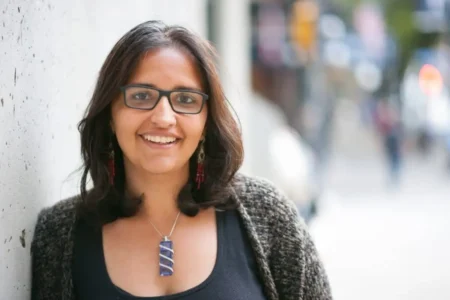Harsha Walia is an influential Canadian activist and writer, whose commitment to social justice, immigration reform, and Indigenous rights has made her a powerful voice in global and local movements. Based in Vancouver, Harsha Walia’s activism spans over two decades, and her unwavering dedication to fighting injustice has earned her recognition and respect worldwide.
From her involvement with organizations such as No One Is Illegal, the February 14 Women’s Memorial March Committee, and the Downtown Eastside Women’s Centre, to her writings that challenge the status quo, Harsha Walia’s work is deeply rooted in the experiences of marginalized communities. Harsha Walia addresses some of the most pressing issues of our time—racism, sexism, colonialism, and capitalism—through her activism, writings, and public engagements.
Early Life of Harsha Walia: A Journey of Migration and Identity
Harsha Walia was born in Bahrain to Punjabi parents. Growing up in a diasporic community exposed her early on to the complexities of migration, displacement, and identity. Harsha Walia’s family later immigrated to Canada, where Walia’s experiences as an immigrant shaped her perspective on the intersections of borders, belonging, and justice.
Harsha Walia pursued her law studies at the University of British Columbia, which equipped her with the legal tools to fight for the rights of immigrants, refugees, and Indigenous communities. From the very start, Walia’s work was not just about providing legal support—it was about dismantling the systems of oppression that marginalized these groups.
No One Is Illegal: Standing Against Border Imperialism
In 2001, Harsha Walia co-founded No One Is Illegal (NOII), a radical migrant justice movement that stands in opposition to border imperialism. Through NOII, Walia has campaigned for the rights of refugees and migrants, advocating for full legal status and access to essential services for all, irrespective of their immigration status. Her activism challenges the very foundation of state-imposed borders, calling them tools of exclusion and discrimination.
NOII operates on the belief that immigration policies are inherently tied to colonialism and capitalism. The movement’s solidarity with Indigenous self-determination reflects Walia’s broader understanding that justice cannot be segmented. Her work reminds us that the oppression of migrants, the theft of Indigenous lands, and the exploitation of workers are interconnected struggles under the same systems of power.
Under her leadership, NOII has fought tirelessly against the deportation and detention of migrants. Campaigns such as the fight to prevent the deportation of Laibar Singh, a paralyzed refugee, and advocating for the release of Tamil refugees aboard the MV Sun Sea, are emblematic of her hands-on approach to activism.
Championing Indigenous Rights and Women’s Empowerment
Walia’s activism has not been limited to immigration politics. She has been a leading advocate for Indigenous rights and women’s empowerment. For over a decade, Harsha Walia has worked closely with the February 14 Women’s Memorial March Committee, which commemorates Indigenous women who have been murdered or gone missing, particularly in Vancouver’s Downtown Eastside (DTES).
This annual march is a powerful act of remembrance and resistance, amplifying the voices of Indigenous women and communities that have been systematically ignored.
Harsha Walia co-directed the short film Survival, Strength, Sisterhood: Power of Women in the Downtown Eastside, which documents the history of the Women’s Memorial March and centers the stories of women who have faced extreme marginalization. Her work continues to bring attention to the violence inflicted on Indigenous women and the urgent need for systemic change.
Additionally, her role as a coordinator at the Downtown Eastside Women’s Centre (DEWC) further showcased her commitment to grassroots activism. Through her facilitation of the Power of Women (POW) group, Walia empowered women in the DTES to resist policies and practices that marginalize them. The group’s annual Women’s Housing March for safe and affordable housing highlights her belief that activism must be community-led, grounded in the experiences of those most affected by injustice.
Writings that Challenge Borders and Oppression
Harsha Walia is not only a prolific activist but also a renowned writer whose works delve deeply into the structural issues of migration, borders, and nationalism. Her book Undoing Border Imperialism (2013) is a groundbreaking text that deconstructs the violent nature of borders and their role in perpetuating colonialism and capitalism. Walia challenges the narrative that borders are necessary for national security and instead posits that they are tools of control that segregate people based on race, class, and power.
Her second major work, Border and Rule: Global Migration, Capitalism, and the Rise of Racist Nationalism (2021), continues this critique by examining how capitalist states manipulate borders to exploit migrant labor while denying migrants basic rights and protections. This book is a clarion call for the global left to recognize that migration justice is inseparable from the broader fight against capitalism and racism.
Walia’s written contributions extend far beyond her books. Harsha Walia has co-authored works such as Never Home: Legislating Discrimination in Canadian Immigration (2015) and Red Women Rising: Indigenous Women Survivors in Vancouver’s Downtown Eastside (2019). In these, she amplifies the voices of those who are often silenced and scrutinizes policies that continue to oppress marginalized communities.
Also Read:Clancee Pearce: A Journey of Grit and Determination in AFL
